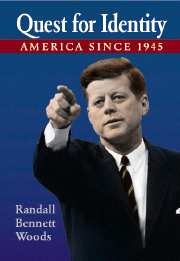Book contents
- Frontmatter
- Contents
- Preface
- 1 The Republic in Transition
- 2 The Origins of the Cold War
- 3 Staying the Course
- 4 Containing Communism and Managing the Military–Industrial Complex
- 5 Capitalism and Conformity
- 6 Liberalism Reborn
- 7 The Wages of Globalism
- 8 The Dividing of America
- 9 Realpolitik or Imperialism? Nixon, Kissinger, and American Foreign Policy
- 10 The Limits of Expediency
- 11 From Confidence to Anxiety
- 12 Governing in a Malaise
- 13 The Culture of Narcissism
- 14 In Search of Balance
- Index
9 - Realpolitik or Imperialism? Nixon, Kissinger, and American Foreign Policy
Published online by Cambridge University Press: 05 June 2012
- Frontmatter
- Contents
- Preface
- 1 The Republic in Transition
- 2 The Origins of the Cold War
- 3 Staying the Course
- 4 Containing Communism and Managing the Military–Industrial Complex
- 5 Capitalism and Conformity
- 6 Liberalism Reborn
- 7 The Wages of Globalism
- 8 The Dividing of America
- 9 Realpolitik or Imperialism? Nixon, Kissinger, and American Foreign Policy
- 10 The Limits of Expediency
- 11 From Confidence to Anxiety
- 12 Governing in a Malaise
- 13 The Culture of Narcissism
- 14 In Search of Balance
- Index
Summary
Richard Nixon entered the White House determined to create a new international order that would simultaneously contain communism and restore America's freedom of action. The author of this vision was Henry Kissinger, a German-born academic known for his admiration of Austrian Chancellor Klemens von Metternich, a nineteenth-century statesman whose approach to international relations had been distinctly non-ideological and counterrevolutionary. Specifically, Nixon and Kissinger, appointed by the president to be national security adviser, wanted to secure “peace with honor in Vietnam” by weakening the Vietcong (VC) and North Vietnamese and strengthening South Vietnam so that the armies of Nguyen Van Thieu could win a battlefield victory on their own. Thus freed from the Vietnam quagmire, with its prestige restored and its military undistracted, the United States could assume the role of arbiter of world affairs. The new Republican administration accepted the implications of NSC 68 – that it was necessary to battle communism on every front – but believed that global containment could be achieved through diplomacy rather than force of arms. In Kissinger's view, the Soviet Union and to a lesser extent Communist China were on their way to becoming satiated, status quo powers. If the United States could disarm their fears and appeal to their economic interests, the two communist superpowers might be persuaded to take their places as responsible members of the international community. Then, as had been true in the days of Metternich, who presided over the Concert of Europe following the defeat of Napoleon Bonaparte, the great powers could act to control revolutions that threatened international stability.
- Type
- Chapter
- Information
- Quest for IdentityAmerica since 1945, pp. 281 - 319Publisher: Cambridge University PressPrint publication year: 2005



